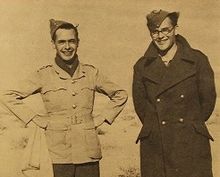Alan Moorehead facts for kids
Quick facts for kids
Alan Moorehead
|
|
|---|---|

Moorehead (left) with Alexander Clifford during the North African Campaign
|
|
| Born | Alan McCrae Moorehead 22 July 1910 Melbourne, Victoria, Australia |
| Died | 29 September 1983 (aged 73) London, England, United Kingdom |
| Resting place | Hampstead Cemetery |
| Nationality | Australian |
| Education | Scotch College, Melbourne |
| Alma mater | University of Melbourne |
| Spouse |
Lucy Milner
(m. 1940) |
| Children | Caroline Moorehead |
Alan McCrae Moorehead, AO, OBE (born July 22, 1910 – died September 29, 1983) was a famous Australian writer and journalist. He became well-known for his exciting books about history and explorations. Two of his most popular books were The White Nile (1960) and The Blue Nile (1962). These books told the story of how the Nile River was explored in the 1800s. Even though he was born in Australia, he lived in England and Italy starting from 1937.
Contents
Alan Moorehead: A Life in Words
Early Life and Becoming a Journalist
Alan Moorehead was born in Melbourne, Australia. He went to Scotch College and then studied at the University of Melbourne. He earned a Bachelor of Arts degree there. In 1937, he moved to England. There, he became a well-known foreign correspondent for a newspaper called the London Daily Express.
Moorehead was a very successful writer. He traveled the world, wrote biographies, essays, and news stories. He married Lucy Milner, who also worked at the Daily Express. She was in charge of the women's page. She made sure her page was interesting and respectful, which was different from many other women's pages at the time.
Reporting from World War II
During World War II, Alan Moorehead became famous around the world. He reported on important military campaigns. He covered events in the Middle East, Asia, the Mediterranean, and Northwest Europe. His reporting was so good that he was mentioned in official military reports twice. He also received an award, becoming an Officer of the Order of the British Empire.
A famous critic named Clive James said that Moorehead was present for many big events. He was there for battles and meetings across North Africa, Italy, and Normandy. He stayed until the very end of the war. James believed Moorehead's book African Trilogy is a great example of his skill. Moorehead could show how local events had a big impact on the whole world. James also said that Moorehead was a better reporter on combat than his friend Ernest Hemingway. Moorehead also wrote a well-regarded book about General Bernard Montgomery in 1946.
Famous Books and Awards
In 1956, Moorehead wrote a book called Gallipoli. This book was about a very difficult and unsuccessful military campaign during World War I. The campaign took place at Gallipoli. The book received a lot of praise from critics. It won the Sunday Times award and a gold medal in England. It was also the first book to receive the Duff Cooper Memorial Award. Sir Winston Churchill himself presented this award to Moorehead on November 28, 1956.
Facing Challenges and His Legacy
In 1966, Moorehead, his wife Lucy, and their children, including his daughter Caroline Moorehead, started visiting Australia every year. During one of these visits, he finished a television script for a book he was writing called "Darwin and the Beagle." However, something very sad happened before the book could be published.
In December of that year, Moorehead had severe headaches. He went to a hospital in London for a medical test. This test caused him to have a major stroke. After an operation, he had brain damage that affected his ability to communicate. At 56 years old, Alan Moorehead, who was known for his amazing communication skills, could no longer speak, read, or write.
Even though he faced this challenge, his writing continued thanks to his talented wife, Lucy. She helped publish Darwin and the Beagle as a beautifully illustrated book in 1969. In 1972, she collected his personal essays and published them as A Late Education. Alan Moorehead passed away in London in 1983. He is buried at Hampstead Cemetery in Fortune Green.
His Papers and Collections
Alan Moorehead's important papers, letters, diaries, and notes have been saved. These include his essays, news clippings, and drafts of his books. In the 1960s, two major American universities wanted to keep his papers as part of their collections of famous writers. But in 1971, Alan and Lucy Moorehead decided to bring his papers to Australia. They personally gave them to the National Library. This means his work is preserved for future generations to learn from.

